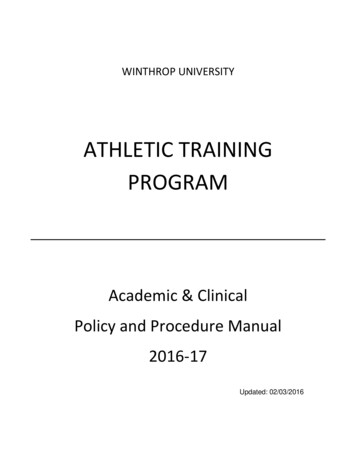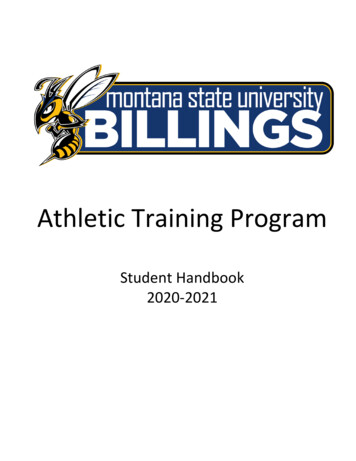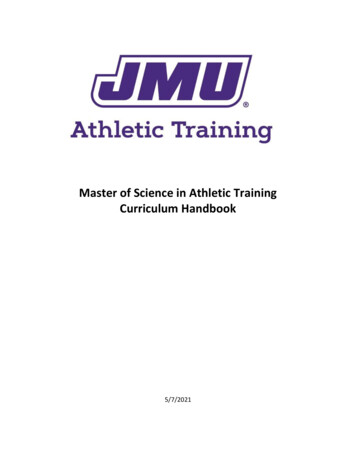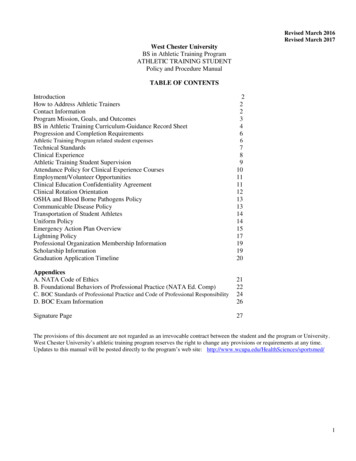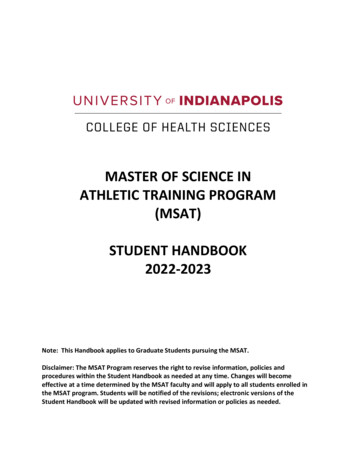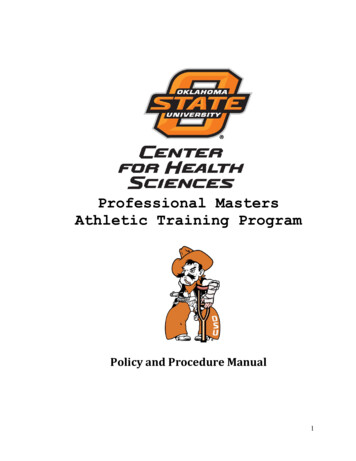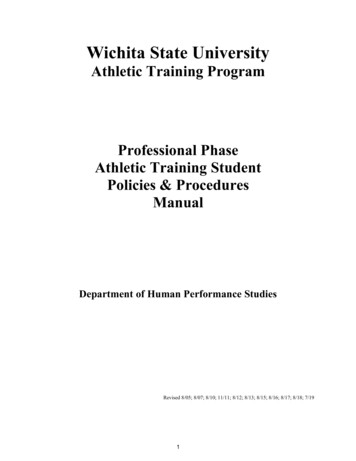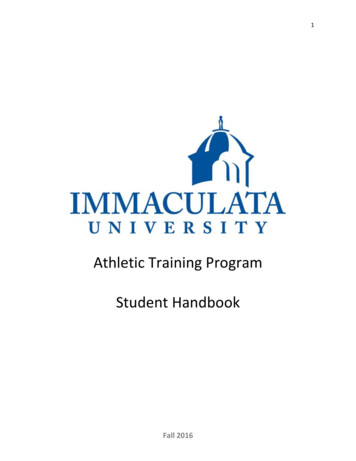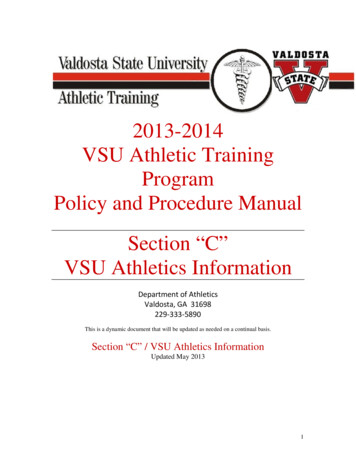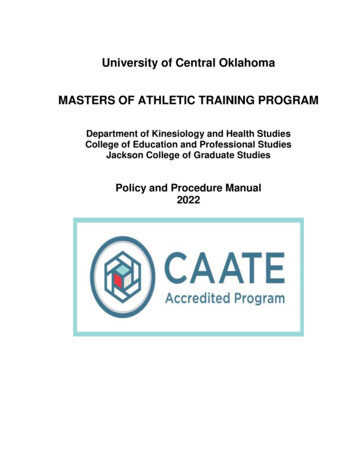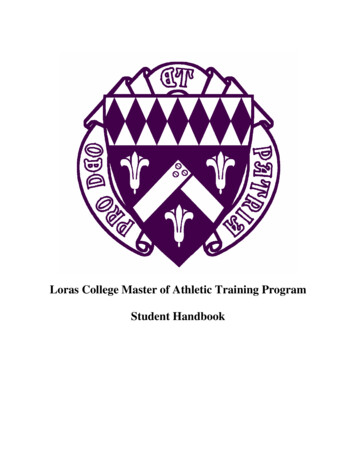
Transcription
WINTHROP UNIVERSITYATHLETIC TRAININGPROGRAMAcademic & ClinicalPolicy and Procedure Manual2021-2022Updated: 08/10/2021
Winthrop UniversityRichard W. Riley College of EducationDepartment of Physical Education, Sport & Human PerformanceAthletic Training ProgramTo: Athletic Training StudentsThe following academic and clinical policies and procedures manual has been preparedfor the athletic training students in the Winthrop University Athletic Training Program(WU-ATP). All students enrolled in the athletic training major must read and accept thesepolicies and procedures. These policies are in addition to those established by WinthropUniversity, the College of Education, and the Department of Physical Education, Sport &Human Performance.The manual provides a brief outline of the athletic training education program, clinicalexperience responsibilities, and guidelines for professional conduct. Specificadministrative guidelines and injury care protocols are not within the scope of this manual.It is the duty of each athletic training student to know and understand the contents of thisdocument. It is the student’s responsibility to seek clarification for items that are not clear.Review this manual and keep it throughout your tenure in the athletic training educationprogram. Any updated information will be given to you as necessary.Alice J. McLaine, PhD, SCAT, ATCMartha Rivera, EdD, SCAT, ATCProgram DirectorAthletic Training ProgramClinical Education CoordinatorAthletic Training ProgramSigned:Print Name:Date:
ATHLETIC TRAINING PROGRAM FACULTYAlice J. McLaine, PhD, SCAT, ATCProgram Directormclainea@winthrop.eduMartha Rivera, EdD, SCAT, ATCClinical Coordinatordettlriveram@winthrop.eduWest Center 118Coliseum West Center 116A215.264.6090West Center 116A803.323.4696ATHLETIC TRAINING PROGRAM PRECEPTORS - WINTHROPM. BasketballJeff Lahr803.323.6248lahrj@winthrop.eduW. BasketballDaniel Lundy803.323.6614lundyd@winthrop.eduBaseballW. LacrosseM. SoccerW. SoccerVolleyballX C/ Track & FieldSoftballM. GolfW. GolfTBDKara McHouellJessica DuthieMorgan LaPradeJasmine TateJenna RossAntonio PomaJeff p.eduPomaa2@winthrop.edulahrj@winthrop.eduATHLETIC TRAINING PROGRAM PRECEPTORS - OFF CAMPUS SITESCatawba Ridge High SchoolClover High SchoolFort Mill High SchoolNation Ford High SchoolRock Hill High SchoolSouth Pointe High SchoolYork Comprehensive High SchoolKatie RunyonBre ByerleyKim BresslerMatt BresslerKatherine KiserJustin CheekBen MerrittMolly HarrisSamantha MolonyPat CurleyDana JacobsJessica BurnettBreyana SingletonMax LongAnna AdamsTara .eduAAdams@york.k12.sc.ustara.hoy@atriumhealth.org
GENERAL MEDICAL CONTACTSStudent Health ServicesRuth WalkerPiedmont EMSJaime BaionnoLee SmithVeronica MichaelisOrthoCarolina 197 Piedmont Blvd # 111, Rock Hill, SC 29732Gina St. ClairNurse ManagerQI/Training coordinatorSchedulingAssistant Chief TrainingPractice ManagerBarrett Little, MDPreceptorMichael Roberts, PAPhysician AssistantHeather Kidder, PTPhysical TherapistSpecOrtho – Fort Mill 130 Crisanto Ave Ste B, Fort Mill, SC 29715Glen Feltham, MDPreceptorShannon MarePractice ManagerRenee FelthamFront Office CoordinatorNovant Health – Ballantyne 15033 Ballancroft Pkwy # 200, Charlotte, NC 28277Dr. FeltonPreceptorCaroline MarionClinical Athletic TrainerNovant Health – Waxhaw 3614 Providence Rd S #200, Waxhaw, NC 28173Dr. CulverPreceptorShawn OvercashClinic AdministratorNovant HealthErin HartSports Med Program ManagerAdwoa AhenkoraStudent Clinical Coordinator
TABLE OF CONTENTSSection 1: Winthrop University Athletic Training ProgramIntroduction .Mission Statement.Vision Statement .Goals and Objectives .Section 2: Academic CurriculumProgram Curriculum .Section 3: Admission, Retention, and Completion ProceduresPrerequisites & Application Process .Appeals .Technical Standards for Admission.Retention Policy .Program Communication .Disciplinary Action and Probation.End-of-Program Exam Policy .WU-ATP Checklist .Section 4: Transfer Student and Student Athlete RequirementsTransfer Requirements .Student Athlete Requirements .Section 5: Professional Memberships and ConferencesNational Athletic Trainers’ Association .South Carolina Athletic Trainers’ Association.Conference Attendance .Section 6: Additional Costs Associated with the ProgramSection 7: Clinical EducationTechnical Standards and Immunization Verification.In-Service Training .Types of Experiences.Clinical Experience Course Descriptions .Clinical Responsibilities.Student Priorities.Expectations.Appearance.Acceptable Attire .Unacceptable Attire.Emergency Cardiac Care Certification .Documentation of Hours and Experiences .Family Educational Rights and Privacy Act (FERPA).
Communicable Disease Policy.Health Insurance Portability and Accountability Act(HIPAA) & Confidentiality .Criminal Background Checks .Drug Testing.Potential Risks .Liability Information .Section 8: Professional InteractionsPreceptors.Physicians and other Allied Health Professionals .Athletes/Patients .Peer Athletic Training Students.Coaching Staff.Other Athletic Department Personnel.Professional Scouts, Media and General Public .Section 9: Evaluation of Clinical ExperienceClinical Performance .Athletic Training Facility, Preceptors, andClinical Education Coordinator .Section 10: Certification RequirementsBoard of Certification.Section 11: Exposure Control ProceduresBlood Borne Pathogen Training .Universal Precautions .Wound Care Procedures.Collection and Disposal Procedures .Environment Control Recommendations.Universal Precautions .Environmental Control/Hazardous Waste Policy .Game Management .Section 12: Winthrop University Athletic Training Emergency Action Plans
Section 1: Winthrop University Athletic Training ProgramIntroductionAthletic training is a healthcare profession that provides prevention, clinical diagnosis,routine and emergent care, and rehabilitation of injuries and medical conditions. Theprofession involves the organization and administration of athletic training programs, aswell as wellness promotion, education, and counseling of patients. Athletic training isrecognized by the American Medical Association as an allied health care profession andis practiced under the supervision of or in collaboration with a physician. The governingbody for the profession is the National Athletic Trainers’ Association (NATA). Theorganization responsible for the certification of athletic trainers is the Board ofCertification, Inc. (BOC).Since the founding of the NATA in 1950, the role of the professional athletic trainer haschanged dramatically. The certified athletic trainer is an essential member of the athletichealth care team in a variety of settings including secondary schools, colleges anduniversities, professional sports teams, sports medicine clinics, industrial settings, andmedical offices. Education standards implemented in the late 1960's, along with theconcept of certification of athletic trainers, have greatly increased the demand for specificcurricular content to meet the needs of the aspiring athletic trainer. Athletic trainingeducation is complex process. Programs that provide professional education in athletictraining must seek accreditation from the Commission on Accreditation of AthleticTraining Education (CAATE).The Department of Physical Education, Sport & Human Performance (PESH) is thehome of the Winthrop University Athletic Training Program (WU-ATP) which offers theBachelor of Science degree in Athletic Training. The degree requires 125 semesterhours of course work including specific clinical experiences. The WU-ATP receivedinitial accreditation in 2004.Admission to Winthrop University does not guarantee admission into the WU-ATP.Competitive admission is based on assessments of the applicant’s academic success,written and oral communication skills, athletic training experience, and recommendationletters. Minimum standards for academic and clinical performance are required to enterand continue in the WU-ATP. These standards are listed in Section 3.The WU-ATP is a rigorous preparatory experience for future athletic trainers. Studentswill develop and demonstrate competence in the specific subject matter areas defined inthe Athletic Training Education Competencies. Additionally, students will develop anddemonstrate proficiency in requisite clinical skills and behaviors.
Mission StatementThe mission of the WU-ATP is to prepare the athletic training student to sit for the Board ofCertification Exam and to accept an entry level position as a certified athletic trainer or entera graduate program in athletic training or a related area. In order to accomplish this mission,students will be provided with high quality didactic and clinical education, which incorporates,at a minimum, the competencies and clinical proficiencies published by the Commission onAccreditation of Athletic Training Education (CAATE).Vision StatementThe WU-ATP will be a program of recognized excellence by virtue of its record of preparingATs who make significant contributions to the athletic training profession, have a life-longcommitment to intellectual growth, and strive to improve their skills as allied health careproviders throughout their entire professional career.Goals and Objectives1. To provide each student with high quality didactic and laboratory coursework thatincorporates contemporary knowledge in athletic training.2. To provide each student with supervised clinical experiences in a variety of settingswith preceptors who are committed to student development and who serve as rolemodels of professional involvement.3. To develop appropriate knowledge, skills and abilities in the student to prepareher/him for employment or post-baccalaureate education.4. To develop written and verbal communication skills in each student.5. To promote professional and ethical conduct in the student at all times.6. To foster reflective, evidence-based practice in each student.7. To foster an appreciation of athletic training as a health care profession in thestudent.8. To establish the importance of continuing education and professional involvementin the student.9. To assist the student in gaining employment or entrance into post-baccalaureatestudy.
Section 2: CurriculumFreshman--FallACAD 101 or electiveQuantitative Gen. Ed. (MATH 150)WRIT 101HLTH 300 Pers & Com HlthATRN 151 Foundations of ATSocial Science (PSYC 101)Sophomore--FallBIOL 213 Anatomy & Physiology ICRTW 201Oral CommunicationATRN 361 Adv. Emerg. Care*ATRN 310 Assess: L Ex*ATRN 311 Assess: L Ex Lab*ATRN 201 Clinical Obs in ATJunior--FallBIOL 214 Anatomy & Physiology IIEXSC 501 Org & Ad of PE & SportATRN 330 Assess: Head/Trunk*ATRN 331 Assess: Head/Trunk Lab*ATRN 563 Med Aspects*ATRN 381 Advanced Taping Lab*ATRN 301 or 303 Clinical Exp in AT IISenior--FallEXSC 401 Sport PsychPESH 381 Research MethodsEXSC 480 Ex Test & PreATRN 480 Capstone in AT*ATRN 400 AT Exam ReviewATRN 401 Clinical Exp in AT IV2020-202113333316Freshman--SpringHMXP 102Technology (CSCI 101)CHEM or PHYS Gen. Ed.NUTR 221PESH 102 Weight TrainingPESH 201 FA & CPRATRN 152 Found of AT Lab*433221116Sophomore--SpringEXSC 382 BiomechanicsHumanities & ArtsPESH 242 M. Learn & ControlATRN 320 Assess: U Ex*ATRN 321 Assess: U Ex Lab*ATRN 350 Ther. Modalities*ATRN 351 Ther. Modalities Lab*ATRN 202 Clinical Exp in AT SpringEXSC 384 Ex. PhysEXSC 385 Ex Phys LabEXSC 465 Strength & CondATRN 450 Ther Ex & Rehab*ATRN 451 Ther Ex & Rehab Lab*ATRN 510 Pharmacology & Drug Ed*ATRN 302 or 304 Clinical Exp in AT IIISenior--SpringHist. Persp. & Constitution (HIST 211)Global PerspectivesHumanities & ArtsSocial ScienceATRN 400 AT Exam ReviewATRN 402 Clinical Exp in AT V31321321533331316TOTAL: 127-128*Offered only that semesterModified May 2020
Section 3: Admission, Retention, and Completion ProceduresApplication ProceduresAll students seeking to complete the Clinical Stage of the WU-ATP must meet all admissionrequirements and be formally admitted before they are allowed to enroll in the advancedclinical experience courses.Transfer students must request a review of their transcripts. Appropriate transfer courses willbe accepted if deemed equivalent by Winthrop University admissions and academicpersonnel. Transfer students who are admitted into the WU-ATP will be required to completeall of the clinical education components at Winthrop University.Admission into the Clinical Stage of the WU-ATP is a competitive process. Completing theapplication requirements does not guarantee admission into the WU-ATP. The WU-ATPis bound by accreditation standards to maintain strict ratios between athletic training studentsand clinical instructors and to assure that all athletic training students can meet rigoroustechnical standards; it is possible that a student might fulfill the application requirements andbe denied admission into the WU-ATP.All applicants for admission into the Clinical Stage of the WU-ATP must meet the followingrequirements:1. Complete a minimum of 30 semester hours.2. Achieve a minimum cumulative grade point average of 2.5 for all coursework and aminimum cumulative grade point average of 2.75 for all coursework in the AthleticTraining core.3. Complete the following Athletic Training core courses with a grade of “C” or better ineach course: ATRN 151, ATRN 152, PESH 201.4. Enroll in BIOL 213 or BIOL 214 (or equivalent). --Students who do not earn a grade of“C-“or better may be given probationary status in the ATP.5. Complete a minimum of 75 hours of directed observation with certified athletic trainers.At least 25 of the hours must be done in an athletic training setting outside of WinthropUniversity.6. Submit an Application for Admission to the WU-ATP to the Program Director thatincludes:o official transcripts from all institutions of higher education attended.o WU-ATP application form.o an admission essay that documents the student’s growth toward becoming anallied health professional.o two letters of recommendation, one should be from a certified athletic trainer.o log which documents 75 observation hours.7. Undergo a standardized interview with the Admission Selection Committee comprisedof the Program Director, Clinical Education Coordinator, Winthrop University HeadAthletic Trainer, Winthrop University Assistant Athletic Trainer(s), one off-campuspreceptor (when available), and two current athletic training students.
Only students who meet requirements 1-3 are allowed to submit applications foradmission into the WU-ATP.Students denied admission to the WU-ATP and/or dismissed from the WU-ATP may appealthe decision in the following steps:1. Submit a letter of appeal to the Program Director and the Chair of PESH. The lettershould detail how the student believes he/she has met the appropriate criteria.2. Each appeal will be reviewed by an Appeals Committee comprised of the Chair ofPESH and two faculty members of the Chair’s choice.3. Upon review of the appeal, the Appeals Committee may request input from theselection committee and the student may request an open discussion with the AppealsCommittee to explain his/her position.4. The Appeals Committee will submit a written document to the student and to theProgram Director regarding the decision on the student’s status.5. All Appeals Committee decisions remain confidential and final.Technical Standards for AdmissionThe Winthrop University Athletic Training Program (WU-ATP) is a rigorous and intenseprogram that places specific requirements and demands on the students enrolled in theprogram. An objective of this program is to prepare graduates to enter a variety ofemployment settings and to render care to a wide spectrum of individuals engaged inphysical activity. The technical standards set forth by the WU-ATP establish the essentialqualities considered necessary for students admitted to this program to achieve theknowledge, skills, and competencies of an entry-level athletic trainer, as well as meet theexpectations of the program’s accrediting agency (CAATE). The following abilities andexpectations must be met by all students admitted to the WU-ATP. In the event a student isunable to fulfill these technical standards, with or without reasonable accommodation, thestudent will not be successfully advanced through the WU-ATP.Candidates for selection to the WU-ATP must demonstrate:1. the mental capacity to assimilate, analyze, synthesize, integrate concepts and problemsolve to formulate assessment and therapeutic judgments and to be able distinguishdeviations from the norm;2. sufficient postural and neuromuscular control, sensory function, and coordination toperform appropriate physical examinations using accepted techniques; and accurately,safely and efficiently use equipment and materials during the assessment andtreatment of patients;3. current immunization status including: measles (rubeola), rubella, mumps, andhepatitis B;4. the ability to communicate effectively and sensitively with patients and colleagues,including individuals from different cultural and social backgrounds; this includes, but isnot limited to, the ability to establish rapport with patients and communicate judgmentsand treatment information effectively. Students must be able to understand and speakthe English language at a level consistent with competent professional practice;
5. the ability to record physical examination results and a treatment plan clearly andaccurately;6. the capacity to maintain composure and continue to function well during periods ofhigh stress;7. the perseverance, diligence and commitment to complete the athletic training programas outlined and sequenced including all required clinical experience hours;8. flexibility and the ability to adjust to changing situations and uncertainty in clinicalsituations;9. affective skills and appropriate demeanor and rapport that relate to professionaleducation and quality patient care;10. professional appearance and attire that are appropriate for the assigned clinicalsetting;11. professional work ethic which includes punctuality, consistent attendance, andadherence to the rules of the assigned clinical setting.Candidates for selection to the WU-ATP will be required to verify they understand and meetthese technical standards or that they believe that, with certain accommodation, they canmeet the standards.The staff of the Office Accessibility will evaluate a student who states he/she could meet theWU-ATP’s technical standards with accommodation and confirm that the stated conditionqualifies as a disability under applicable laws. If a student states he/she can meet thetechnical standards with accommodation, then the University will determine whether it agreesthat the student can meet the technical standards with reasonable accommodation; thisincludes a review of whether the accommodations requested are reasonable, taking intoaccount whether accommodation(s) would jeopardize clinician/patient safety, or theeducational process of the student or the institution, including all coursework, clinicalexperiences, and internships deemed essential to graduation.Compliance with the WU-ATP’s technical standards does not guarantee a student’s eligibilityfor the BOC certification exam.Retention PolicyOnce admitted into the WU-ATP, the student will be evaluated each semester. Ifappropriate progress is being made, the student will be allowed to advance to the nextsemester. In order to continue in the WU-ATP a student must meet the followingcriteria:1. Maintain a minimum 2.5 overall grade point average and a minimum 2.75 gradepoint average in the Athletic Training major.2. Complete all major courses with a grade of “C-” or better in each course.3. Take all clinical experience courses for a grade, S/U grading is not allowed in clinicalexperience courses.
4. Complete human anatomy course by the time the student completes ATRN 330/331.5. Complete human physiology course by the time the student completes ATRN450/451.6. Successfully complete each competency/proficiency/student learning objective(SLO) covered each semester.7. Meet all deadlines detailed on the WU ATP Checklist.8. Be in good standing in the university community.If progress is unsatisfactory in clinical or classroom performance, the student may be placed onprobation for one semester in order to remedy any deficiencies. During the probationarysemester, a specific plan designed to address the unsatisfactory area(s) will be developed bythe student and program administrators. If the deficiencies are not remedied in the time frameallotted, the student will be dismissed from the program. The Program Director shall monitorstudent progress from one semester to the next and will make all probationary decisions inconsultation with the Clinical Education Coordinator.Program CompletionTo exit the ATP, athletic training candidates must meet all degree requirements as well as thefollowing requirements:1. Successful completion of a minimum of 120 semester hours with a minimum GPA of 2.5.2. Completion of the athletic training core with a minimum GPA of 2.75.3. Completion of BIOL 213 and BIOL 214 (or equivalent) with a minimum grade of “C-” in each.4. Successful completion of a competency and proficiency review by the Program Director, ClinicalCoordinator, and one preceptor.Program CommunicationEach student is required to check Blackboard and their Winthrop University E-Mail accountdaily. Repeated failure to respond to WU-ATP faculty in a timely fashion may result insuspension or dismissal from the program.Disciplinary Action and ProbationSelf-discipline is expected of college students. If an athletic training student fails tomaintain appropriate standards of behavior and appearance, fails to meet his/herclinical assignment, in some other way neglects to meet the responsibilities of amember of the WU-ATP, or does not follow the guidelines stated in this handbook,he/she is subject to disciplinary action. Disciplinary action is based on the severity ofthe infraction and will be determined by the Program Director, Clinical EducationCoordinator, and preceptor (if appropriate). The Program Director, Clinical EducationCoordinator, and preceptor will consider the nature of the infraction, the student's pastrecord, and any extenuating circumstances. Disciplinary action will range fromreprimand, to probation, to suspension, to expulsion. Decisions regarding discipline
are the responsibility of the Program Director, the Clinical Education Coordinator, andthe preceptor. These decisions are not made by student members of the WU-ATP.Disciplinary actions will be noted in the student’s permanent athletic training folder.End-of Program Exam PolicyAll students must complete the End-of-Program Exam (EOP Exam) prior to graduation.The purpose of the EOP Exam is to help the program administrator’s identify areas ofweakness in the program and to help an athletic training student to assess whether ornot he/she is ready to take the BOC Certification Exam. If a student does not pass theEOP Exam, he/she must spend further time in exam preparation. The administrators ofthe WU-ATP feel it is the duty of educational institutions to set standards for thoseallowed to sit for the national examination. By implementing this exam, we hope toidentify students who need further preparation before challenging the national exam andto identify areas in the educational program which need strengthening.The WU-ATP End-of Program Exam consists of two sections:Section I:Section II:Objective – multiple choice, true/false, matchingListing – situational, problem solvingThe examination will be administered during a student’s final year in the WU-ATP.Students will take the examination on a scheduled date and must be scheduled prior tocompleting ATRN 480.A student must receive 75% on each portion to pass the examination. If a studentscores less than 75% on any section, he/she may retake the section(s) in a minimum of2 weeks.If the second attempt is not 75%, he/she may retake the section(s) in a minimum of 1month.If the third attempt is not 75%, the student will be required to obtain additional educationprior to challenging the section(s).
WINTHROP UNIVERSITY ATHLETIC TRAINING PROGRAMPROGRESS CHECKLISTNAME:SemesterDate Entered:OverallGPAATGPASignificant Clinical eted prior to admission (minimum grade of “C”):ATRN 151ATRN 152PESH 201Completed by February 1 or September 15 of first semester in program:Physical ExaminationHepatitis B vaccination or waiverCompleted for ATRN 302, 303 or 304:TB Skin TestFlu ShotSuccessful completion of human anatomy courseSuccessful completion of human physiology courseSuccessful completion of biomechanics courseSuccessful completion of exercise physiology courseNATA Membership:SophomoreJuniorSeniorSCATA Membership:SophomoreJuniorSeniorProfessional conference attendance:SophomoreJuniorSeniorGeneral AreaBasic TapingAdvanced TapingLEx EvaluationsU Ex EvaluationsHead/Trunk EvaluationsEmergency ProceduresModalitiesProtective EquipmentRehabilitationGeneral MedicalPharmacologyInitial ReviewATRN 152ATRN 381ATRN 311ATRN 321ATRN 331ATRN 361ATRN 351ATRN 381ATRN 451ATRN 330/563ATRN 510Second CheckATRN 201ATRN 401ATRN 202ATRN 301/401ATRN 401ATRN 381/401ATRN 301/401ATRN 401ATRN 401ATRN 302/401ATRN 302/401Successful Completion of Winthrop University End of Program Exam.NATA Membership #Initial placement:BOC Certification #Final
Section 4: Transfer Student and Student Athlete RequirementsTransfer RequirementsTransfer by the completion of the freshmen year is recommended for timely completion of theprogram. All students must complete five full clinical rotations throughout their time in theWU-ATP. After fall 2020, transfer into the Bachelor of Science in Athletic Training will not bepossible.Student Athlete RequirementsStudents accepted into the WU-ATP are allowed to participate in varsity athletics at WinthropUniversity. Each student must understand the time commitment required for both programs.Participation in a varsity sport will usually require an additional semester of clinicalexperience, typically taken after completion of NCAA eligibility.
Section 5: Professional Membership and ConferencesNational Athletic Trainers’ AssociationAll athletic training students must beco
Athletic Training Program Athletic Training Program Signed: Date: Print Name: ATHLETIC TRAINING PROGRAM FACULTY Alice J. McLaine, PhD, SCAT, ATC West Center 118 803.323.3711 Program Director Coliseum 25 803.323.2177 mclainea@winthrop.edu 803-984-2005 Martha Rivera .
